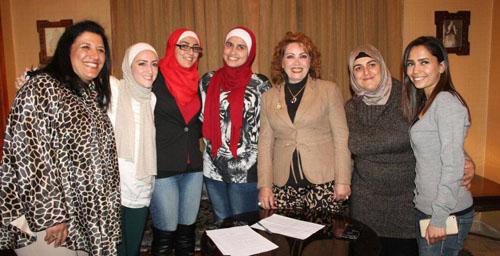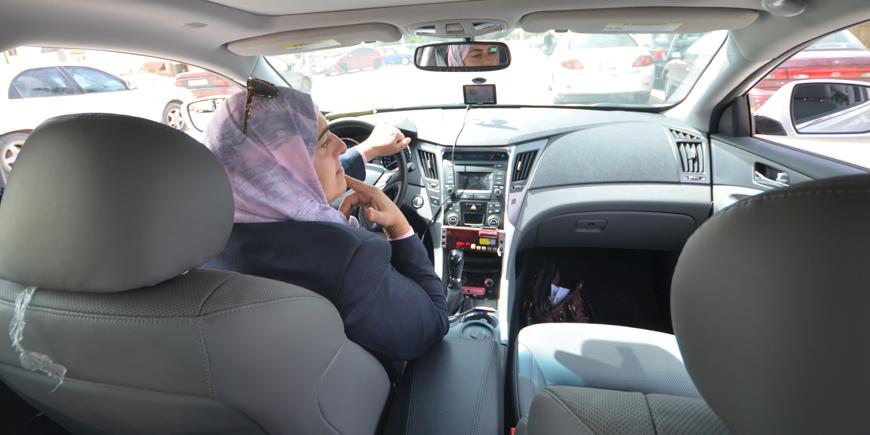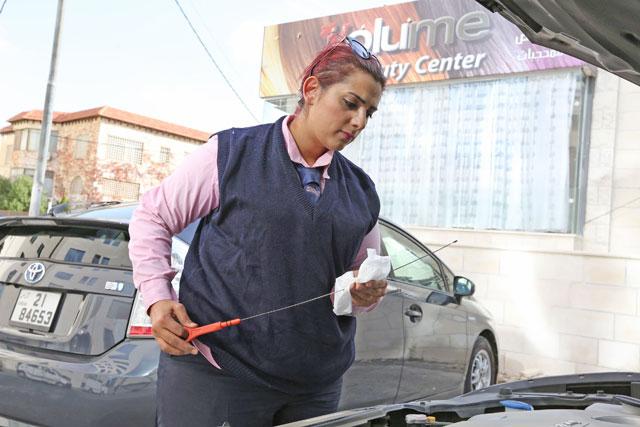You are here
Projected female-exclusive taxi service looks to offer safe transport, job opportunities for women
By Muath Freij - Mar 18,2015 - Last updated at Mar 18,2015

AMMAN – The unpleasant experiences of four Jordanian women and their friends in dealing with a number of cabdrivers have pushed them to launch a new project for a female exclusive taxi service.
Dubbed “Shecab”, the project entails providing taxis for women only and for their families in the Kingdom, according to one of the founders, Rahmeh Abushweimeh.
It all started when the four women separately submitted applications to the US embassy in Amman for a women empowerment programme called “Women’s role in leadership”, Abushweimeh told The Jordan Times in a recent interview.
“They accepted our applications and we took part in the five-week programme at Saint Mary’s College, which is a university only for women, in late June 2014,” she said. “In the fifth week, they organised a contest for the participating countries. We were asked to do a project that provides awareness and services that benefit women in our societies.”
Abushweimeh said they came up with Shecab, which hires women taxi drivers to pick up only female passengers.
“The aim behind our project is to provide women with job opportunities and offer female passengers a safer means of transport. We are aware of the fact that security prevails in the Kingdom but some taxi drivers deal with us in an uncivilised manner.”
The Shecab team received a $1,000 fund launched in October 2014 by the college after the training programme concluded.
“We believe in our idea and we want to go ahead with it,” she added.
Abushweimeh, who is studying pharmacology at university, said the funding was used to train three women to obtain taxi driving licences.
“Each licence costs JD68,” she said, adding that they have also registered their company.
“Our cars will also equipped with GPS so that families of passengers can track their relatives.”
Abushweimeh said Shecab also applied for funding through the US State Department’s Alumni Engagement Innovation Fund.
“A total of 800 applications were sent from Jordan and we are the only ones from here to be among the finalists for the $25,000 fund. People will now start voting for the best project,” she added.
Maha Amad, Shecab co-founder, said she personally faces challenges when she wants to take a taxi in Jordan.
“They always ask me where I want to go and many of my friends complained about some drivers. This motivated me and all my colleagues to work hard to make our idea happen,” Amad told The Jordan Times, noting that the enthusiasm it received also encouraged them to move ahead.
“Two of our friends from the US started an online donation campaign to support us,” she added.
Salam Abu Khadra, another co-founder, said they do not expect to be able to implement the project without any hiccups but voiced her faith in the Jordanian community.
“So far, most people have shown support and excitement.”
Abushweimeh said they are meeting people who are interested in supporting Shecab, but it is not enough.
“As soon as we receive sufficient donations, we will start implementing our project. The permit to brand each car as a taxi costs around JD42,000, so we hope that the government and the Greater Amman Municipality support us to be able to afford more than one car,” she added.
By the beginning of next month, Shecab’s business plan will be ready to receive public contributions, according to Amad.
Hiyam Ayyad, mother of seven, said the number of complaints she received from her friends over the negative behaviour of some taxi drivers has encouraged her to be among Shecab’s drivers.
“Many men oppose the idea but if we implement it, girls will feel comfortable taking a taxi”.
Meanwhile, Jordanian women interviewed by The Jordan Times had mixed feelings about Shecab, with some welcoming the project and others, like Dina Bataineh, arguing there are other more important issues than female-exclusive taxis.
The private sector employee said she does not mind taking a taxi whose driver is either male or female.
“To be honest, I have not faced any negative experience with a taxi driver in Amman,” Bataineh added.
Tamara Ayyoub, who also works in the private sector, disagreed, noting that she would not dare to go in a cab alone.
“Many girls cannot take a taxi if they want to go out in the evening, so if there is a female taxi driver, I will definitely go for it,” Ayyoub said.
Lamees Daraghmeh, a university student, had similar views, noting that her family always picks her up because she does not trust taxi drivers.
“Sometime I am forced to cancel an appointment if I know that I have to take a taxi,” she added.
Related Articles
AMMAN – As Nadia Salem drives her taxi on the streets of the capital, many drivers find it a strange sight.The looks of surprise from other
AMMAN — Nisrin Akoubeh checks the oil and water before getting into her taxi and pulling into Amman’s heavy traffic for another day of shutt
AMMAN — Noor Jordan for Transport — Taxi Moumayaz will start operating hybrid vehicles in the capital driven by women by the end of this mon













